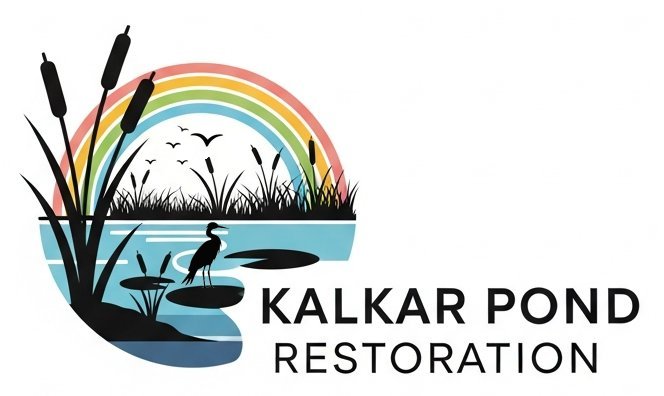Kalkar Pond Internships

What is Kalkar Pond?
 |
|
Kalkar Pond is a 1.5 acre pond located in a 4 acre wetland/open space located adjacent to the base of campus (click for map).
It is located on private land, owned by a group of homeowners who manage it for the benefit of habitat,
creatures that live in the habitat, and humans that live around the habitat.
This creates an interesting set of real-world issues that often face ecologists who need to balance
the needs of the natural world, and the humans who are a part of the natural world.
The pond is a remarkable, and fairly rare ecosystem - a thriving wetland within the bounds of a city.
It is home to a wide variety of animals, plants, and other life that have few other places locally to live.
It provides many opportunities for:
- learning about wetland ecosystems
- helping to protect and enhance the environment
- doing observation, journaling and nature study
- performing a variety of types of biological, ecological, artistic, and engineering research
- getting experience in policy related to regulation, working with NGOs and homeowner interests
- using your creative and physical efforts to have a tangible impact on an ecosystem
Kalkar Pond Restoration is not an organization per se. It's a project of Ron Goodman and a few friends who have taken on the
responsibility of managing the wetland on behalf of the (fairly hands-off) Homeowners Association that owns the land.
There are pros and cons to consider about an internship with an informal project like Kalkar
Pond Restoration.
|
Who can intern at the pond?
 |
|
ENVS internships are open to both UCSC ENVS and non-ENVS majors. Students at Cabrillo College may participate as well, but currently not for credit.
There are projects that could be completed at the Kalkar Pond in a diversity of majors such as
Environmental Studies, Ecology & Evolutionary Biology (and other Biology majors), Computer Engineering, Art, Earth Sciences, History, and Environmental Science.
Although experience and background are very helpful, the main qualification is passion in one or more of these topics:
- Birds - Kalkar is a birding hotspot, and a lot of the restoration work is to create bird habitat. A strong interest in birds is an asset.
- Amphibians - Wetlands are for amphibians, so a lot of ecological work here involves thinking about how our interventions impact amphibians.
- Arthropods, especially insects - Insects play important roles in a wetland ecosystem, including pollinating, being a food source, decomposition/nutrient cycling, habitat modification.
- Aquatic plants, algae, phytoplankton and zooplankton - These form the base of the trophic structure of a wetland.
- Geology - Kalkar sits in the remnants of a unique limestone quarry that was active until 1969, and it is part of the larger karst system that surrounds it.
- Water chemistry fundamentally impacts the life at Kalkar, so understanding these impacts and monitoring water chemistry is important.
- Hydrology/hydraulics - The natural and engineered flow of water in the pond have deep and interconnected impacts on the ecology of Kalkar.
- History - Kalkar Pond is the biggest headwater of the creek that Santa Cruz was named after,
and the water of this area has a rich history.
- Art - Fiber art with wetland plants like bulrush and cattails has interesting artistic and cultural applications.
- Engineering - Technology has many potential uses for automated monitoring and analyzing of animal behavior and ecological variables.
|
What will I do as an intern?
 |
|
This will depend a lot on your project.
Most internships will include some physical restoration. This could be planting native wetland flora or weeding on dry land, or putting on waders and
doing work in the water. If you are doing an observation study, it may involve dip-netting, microscopy, animal or plant counts using various sampling techniques,
visits to other ponds, etc.
If you are doing an engineering project, it may be a combination of computer work and deploying sensors in or near water. Art projects could involve photography,
working with reeds, or painting. History projects might involve library and online research and developing interpretive signs.
Some ENVS internships are structured, and you are joining established projects. Most Kalkar Pond projects are less structured - part of your internship will
co-developing a project and implementing it (with guidance from your advisor, the Kalkar Pond Manager, and other interns). You won't be on your own,
but we do want you to be involved in planning your work.
Click here to view some sample projects you might do at Kalkar Pond
|
How do I get started?
 |
|
To intern at Kalkar:
|
How do I learn more about Kalkar Pond Internships?
 |
|
You can visit the Kalkar website.
You can visit the Kalkar Pond itself - wander down to the pond at the base of campus.
And after your initial email, if it makes sense to go forward, we can schedule a time to meet at the pond (or online if you can't make it in person) and talk about your internship plans.
|
|





